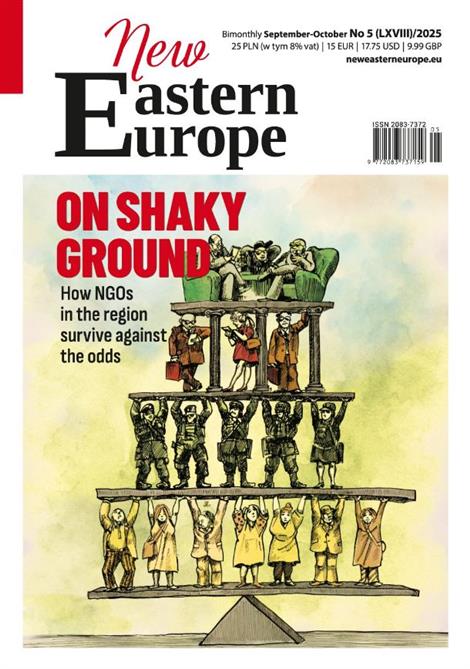


Resistance, resilience, recovery: Ukraine’s civil society in wartime
Liza Bezvershenko examines how Ukraine's civil society has not only endured but strengthened amidst the ongoing conflict. Despite external aggression, civic organizations have played a pivotal role in supporting communities, advocating for democratic values, and contributing to the nation's resilience.
Georgian civil society forced into survival mode
Nino Lezhava discusses the challenges faced by Georgia's civil society, highlighting the increasing pressures and restrictions that have compelled NGOs to adopt survival strategies. The article delves into the implications of these challenges for democratic governance and civic engagement in the country.
„If the EU wants peace, it needs to prepare for war“
In this interview, Andrius Kubilius, former Prime Minister of Lithuania and current EU Commissioner for Defense, explains the growing strategic importance of the Baltic states in shaping Europe's response to threats.
„Nordic-Baltic total defence. Easier said than done“ – Minna Ålander und Eric Adamson
Ålander and Adamson analyze the challenges and complexities of an integrated Nordic-Baltic defense approach that goes beyond traditional military strategies and encompasses civil resilience and social cohesion.
Das Magazin New Eastern Europe ist ein Gemeinschaftsprojekt der Stadt Danzig, des Europäischen Zentrums der Solidarität und des Jan-Nowak-Jezioranski-Kollegs für Osteuropa (Breslau). Die Redaktion befindet sich in Krakau, Polen.
Die Mission von New Eastern Europe ist es, Osteuropa eine Stimme zu geben, die Debatte zu gestalten, das internationale Verständnis zu fördern und die Herausforderungen der Länder zu beleuchten, die früher der Sowjetunion gehörten oder unter ihrem Einfluss standen. New Eastern Europe ist keine wissenschaftliche Zeitschrift, sondern verfolgt einen journalistischen Ansatz mit Kommentaren und Analysen von Journalisten, Experten, Analysten, Schriftstellern, Historikern sowie führenden Persönlichkeiten und Politikern aus Ost und West.
New Eastern Europe richtet sich an politisch interessierte Leser weltweit, Journalisten, Historiker, Politiker, Studenten…
Resistance, resilience, recovery: Ukraine’s civil society in wartime
Liza Bezvershenko examines how Ukraine's civil society has not only endured but strengthened amidst the ongoing conflict. Despite external aggression, civic organizations have played a pivotal role in supporting communities, advocating for democratic values, and contributing to the nation's resilience.
Georgian civil society forced into survival mode
Nino Lezhava discusses the challenges faced by Georgia's civil society, highlighting the increasing pressures and restrictions that have compelled NGOs to adopt survival strategies. The article delves into the implications of these challenges for democratic governance and civic engagement in the country.
„If the EU wants peace, it needs to prepare for war“
In this interview, Andrius Kubilius, former Prime Minister of Lithuania and current EU Commissioner for Defense, explains the growing strategic importance of the Baltic states in shaping Europe's response to threats.
„Nordic-Baltic total defence. Easier said than done“ – Minna Ålander und Eric Adamson
Ålander and Adamson analyze the challenges and complexities of an integrated Nordic-Baltic defense approach that goes beyond traditional military strategies and encompasses civil resilience and social cohesion.
Das Magazin New Eastern Europe ist ein Gemeinschaftsprojekt der Stadt Danzig, des Europäischen Zentrums der Solidarität und des Jan-Nowak-Jezioranski-Kollegs für Osteuropa (Breslau). Die Redaktion befindet sich in Krakau, Polen.
Die Mission von New Eastern Europe ist es, Osteuropa eine Stimme zu geben, die Debatte zu gestalten, das internationale Verständnis zu fördern und die Herausforderungen der Länder zu beleuchten, die früher der Sowjetunion gehörten oder unter ihrem Einfluss standen. New Eastern Europe ist keine wissenschaftliche Zeitschrift, sondern verfolgt einen journalistischen Ansatz mit Kommentaren und Analysen von Journalisten, Experten, Analysten, Schriftstellern, Historikern sowie führenden Persönlichkeiten und Politikern aus Ost und West.
New Eastern Europe richtet sich an politisch interessierte Leser weltweit, Journalisten, Historiker, Politiker, Studenten…
